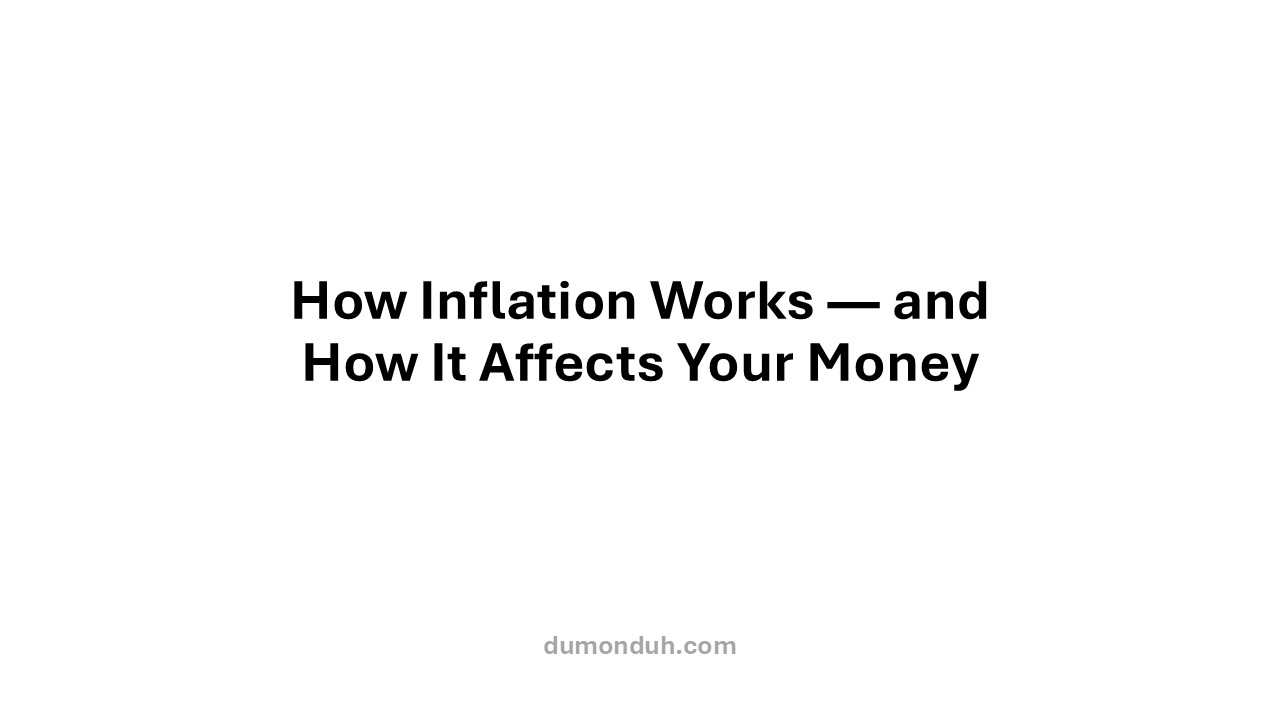Inflation is one of those financial terms that everyone hears but not everyone fully understands. You may notice prices at the grocery store or gas station rising over time, but what’s really happening behind the scenes? Understanding how inflation works is essential because it affects everything from your purchasing power to your savings, investments, and long-term financial goals.
In this article, we’ll break down what inflation is, what causes it, and how it influences your money — and most importantly, how you can protect yourself from its impact.
What Is Inflation?
At its simplest, inflation refers to the rise in prices of goods and services over time, which decreases the value of money. When inflation goes up, each dollar buys less than it used to. For example, if something costs $100 today and inflation rises by 5% next year, that same item would cost $105 a year later.
Inflation isn’t inherently bad — moderate inflation is actually a sign of a healthy, growing economy. However, when it rises too fast or stays high for too long, it can reduce consumers’ real income and savings power.
What Causes Inflation?
Economists generally classify inflation into three main types:
1. Demand-Pull Inflation
This happens when demand exceeds supply. For example, during strong economic growth, people have more money to spend, which increases demand for goods and services. Businesses, unable to keep up with demand, raise prices.
2. Cost-Push Inflation
This occurs when production costs increase, leading companies to raise prices to maintain profit margins. For example, when oil prices rise, transportation and manufacturing costs go up, causing prices for goods to increase.
3. Built-In Inflation
Also known as wage-price inflation, this happens when workers demand higher wages to keep up with rising costs of living. When companies raise wages, they often increase prices to offset the added labor expenses — creating a self-perpetuating cycle.
How Inflation Is Measured
Inflation is typically measured by tracking price changes in a basket of consumer goods and services over time. The most widely used measure is the Consumer Price Index (CPI). The CPI tracks how much prices for everyday essentials — like food, housing, and transportation — change each month or year.
Central banks, such as the U.S. Federal Reserve, use inflation data to guide monetary policy. Most target a stable inflation rate around 2% per year, which balances economic growth and price stability.
How Inflation Affects Your Money
Inflation touches nearly every aspect of your financial life. Here’s how it impacts your money directly:
1. Purchasing Power
When prices rise faster than your income, your purchasing power declines. This means you can buy fewer goods and services with the same amount of money. For example, if your salary stays the same but inflation increases by 6%, your real income effectively falls.
2. Savings and Cash
Cash sitting in a savings account earns little to no interest. Over time, inflation erodes its value. For instance, $1,000 saved today might only buy $800 worth of goods ten years later if inflation averages 2% annually.
3. Investments
Inflation can hurt some investments but benefit others. Bonds and fixed-income assets tend to lose value because their returns don’t keep up with rising prices. On the other hand, stocks, real estate, and commodities often rise in value during inflationary periods, as they represent tangible assets or ownership in companies that can adjust prices.
4. Loans and Debt
Inflation can actually help borrowers. When inflation increases but loan payments remain fixed, the real value of debt decreases. For example, if you have a fixed-rate mortgage, you’re paying back the loan with dollars that are worth less over time.
How to Protect Your Finances from Inflation
You can’t control inflation, but you can take steps to shield your money from its negative effects:
-
Invest in assets that outpace inflation, such as stocks, real estate, or inflation-protected securities (like U.S. Treasury TIPS).
-
Avoid holding too much cash, as its value declines over time.
-
Diversify your portfolio across asset classes and regions to reduce risk.
-
Increase your income through side hustles, skills, or career growth to stay ahead of rising costs.
-
Review your budget regularly to adjust for changing prices.
The Bottom Line
Inflation is an unavoidable part of the modern economy, but understanding how it works helps you make smarter financial decisions. While rising prices can seem intimidating, they also reflect economic activity and opportunity. By investing wisely, managing your expenses, and keeping your money active, you can protect your wealth and even benefit from inflationary periods.
Whether you’re saving for retirement or simply trying to make your paycheck stretch further, staying informed about inflation is one of the best ways to secure your financial future.

